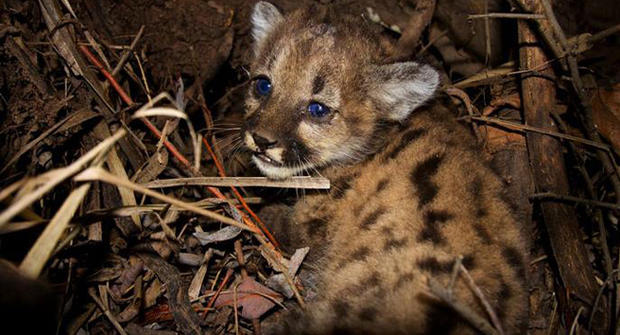2 New Mountain Lion Kittens Found By National Park Service Researchers
MALIBU (CBSLA.com) — Biologists have tracked down two new mountain lion kittens, one in the Santa Monica Mountains and another in the Santa Susana Mountains.
The two new kittens, found on opposite ends of the National Park Service's study area, both happen to be the only single litters documented since mountain lion research began in the Santa Monica Mountain National Recreation Area in 2002, according to a blog post from spokeswoman Kate Kuykendall.
P-43 is a young female kitten found in a remote area near Malibu Creek State Park, born to P-23, whose claim to fame was being photographed by a motorcyclist on Mulholland Highway in 2013. Biologists had been tracking P-23 since she was three weeks old and determined she had had a litter because her GPS points were localized to one small area for the first three weeks after she gave birth, Kuykendall said.
The father of P-23's last litter of kittens was her own father, P-12, so biologists are eager to study P-43's DNA, she said.
P-44, also a female, was found much farther north in the Santa Susana Mountains. She is believed to be the second litter born to P-35, who is estimated to be about 5 years old and was collared in April of 2014. Biologists believe P-38, a large male captured this past March, fathered P-44 due to GPS data that showed the two mountain lions traveled together for a few days three months before the kitten was born, Kuykendall said.
"Mountain lions are solitary animals and typically adults only spend time together if they're fighting or mating," said Biologist Jeff Sikich. "They're both alive and well, so my guess is that P-39 is the father."
Sikich used GPS to track down each mountain lion den where the kittens were found, then brought the kittens to a work-up area at least 100 meters away while their mothers were out hunting, Kuykendall said. At the work-up area, a small team assesses the kitten, takes blood and tissue samples, measurements and marks the kittens, such as with ear tags.




